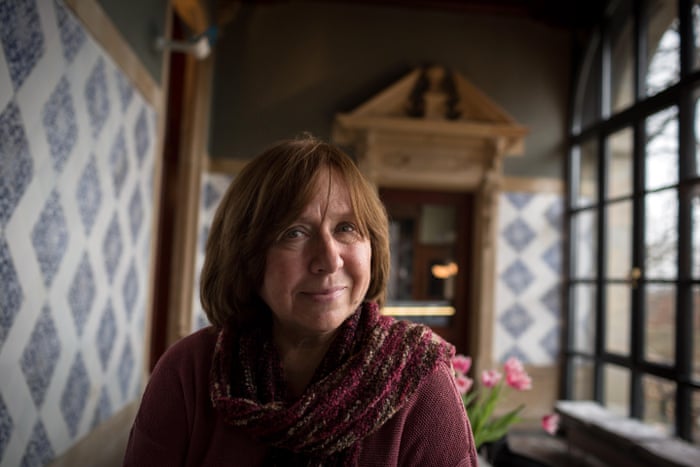Svetlana Alexievich was at home in Minsk when the phone rang. For some
years, she says, rumours had swirled that the Swedish Academy was
considering her name. She had already received many honours. Still, it
had been more than half a century since a non-fiction writer – Winston
Churchill in 1953 – had won literature’s top award. The news from
Stockholm was indeed stunning: Alexievich had won the 2015 Nobel prize in literature.

“This is such an important prize, such an enormous prize, you’d have
to be a complete idiot to expect to win it,” she tells me. Over the next
few hours the phone at her modest two-room flat in Belarus’s capital
rang unceasingly. Callers included Mikhail Gorbachev, the French and German presidents, friends and well-wishers. Thousands of people wrote to her.
One person, though, “kept silent”. This was Belarus’s implacable dictator of 21 years, Alexander Lukashenko.
Lukashenko faced a dilemma: the award was self-evidently a major honour
for Belarus, and yet Alexievich was one of his most prominent critics.
At home, officially at least, she was an unperson. Her books are
unpublished, available only from Russia, or smuggled in via Lithuania in
small underground editions. Her name is missing from school textbooks.
“It was election time. There were lots of international observers, so
Lukashenko was forced to acknowledge the Nobel prize. He congratulated
me that evening on TV,” Alexievich recounts. “Two days later, once the
polls were over and everyone had gone home, he stated publicly that I
decry the peoples of Russia and Belarus in my work.” She adds wryly: “Vladimir Putin didn’t congratulate me either.”
These snubs leave Alexievich unperturbed. They put her, she points out, in the great tradition of “Bunin, Brodsky and Pasternak”.
All were Nobel laureates from the Russian-speaking literary world,
rejected and rubbished by the Soviet leadership. “It’s customary,” she
says, in laid-back tones. “The rhetoric from the state then was the same
as now. These writers were all considered traitors, and said to serve
the CIA and the Americans.”
Alexievich says she understands the “very aggressive” response from
the post-Soviet Union’s twin strongmen. She has openly condemned the
2014 conflict in Ukraine, and describes it as “an occupation and war
unleashed by Russia”. Belarus under Lukashenko, she says, has become a
“small totalitarian reservation” inside Europe. Putin and Lukashenko are
classic despots, with Ozymandian tendencies. “Both think they are some
kind of messiah,” she observes.
I meet Alexievich in Berlin. She is spending several weeks in
residence at the Literarisches Colloquium in the west of the city, on
the peaceful shores of Lake Wannsee. We sit in a corner away from the
window near a portrait of Franz Kafka. Alexievich has sensitive eyes;
she dislikes too much light. She spent 12 years in exile in various
western European cities – Paris, Berlin, Gothenburg – before returning
four years ago to live in Belarus. “I want to live at home. You can only
write at home,” she says.
Data: 15.04.2016
Fonte: www.theguardian.com



















Nessun commento:
Posta un commento